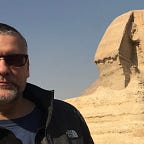Nigeria Journal 2023 04 30: Abuja
I’m sitting at a kitchen table in a Gwarinpa, a quiet and safe neighborhood in Abuja — the capital. It’s warm and humid with the front door half open to let some breeze in. Air conditioning is reserved for the bedrooms. Out here it is warm and humid.
I woke this morning at 7am to loud gospel hymns in English being amplified from somewhere close by. The expat house must be next to a church. Dude had a drum kit too, and occasionally threw in a flourish. He was a terrible singer. Comically bad, reminded me of the video of the South Korean President singing American Pie at the state dinner a couple of days ago.
My expat house in Haiti was also next to a church, so waking up to Sunday morning song is as comfortingly familiar as the sticky air. It’s been my working assumption that what I’ll find in Nigeria will have similarities with my time living in Haiti. It’s an assumption that I have used to set my expectations for my mission here, and one I know will betray me at times. This isn’t Haiti, despite the superficial similarities. The Christians in Haiti can carry a tune.
I got my country level briefings on Thursday and Friday in our Coordination office, and the plan had been to leave for Makurdi Saturday morning. There’s 4 of us making the 6-hour drive and one of my colleagues hadn’t finished work on a midyear budget revision so were doing the drive Monday instead. It was a bit disappointing to be delayed — I am anxious to see my new home and meet those I’ll be working most closely with — but I have the chance to recover from the jet lag and relax a bit before arriving at my project.
My travel from the United States was unremarkable until I arrived at the airport in N’Djamena Chad. There is a certain commonality of international flyers. The distribution of ethnicities and languages may change depending on the flight path, but the socioeconomic requirements of international travel narrows the possibilities. When my flight from Paris to N’Djamena arrived about 75% of the passengers disembarked — and the rest of us, who were continuing to Abuja, waited because we were not allowed to get off the plane.
A stream of flyers, with their carry-on bags and neck pillows, entered to fill some of the vacant seats. After the normal boarding finished a couple of guys came on wearing vests with the UN insignia and “IOM” across the back. I’ve not heard that acronym and googled it from my seat. Turns out to be the International Organization for Migration. The first google entry was about how the IOM was dealing 20,000 refugees that have crossed the border into Chad fleeing the fighting that erupted in Sudan a couple of weeks ago. Behind them were women with colorful embroidered and beaded headscarves, children, and men. The women were all wearing identical lime green gloves, the men all wearing knit caps.
They proceeded, with the help of the cabin crew, to fill every empty seat on the plane. A pair of women were seated across the aisle from me, and I could see their confusion with the seatbelts and headphones, but also their giggling tentative efforts to navigate the entertainment system. Eventually with the help of the UN guys everyone got the seatbelts figured out.
Those green gloves confused me. My first thought was that they were to prevent them from having to make physical contact with men since shaking a Muslim woman’s hand can be taboo — and the men did not have the gloves. Mid-flight I took a stroll to the rest room and saw many of the passengers wrapped head to toe in blankets. I was wearing a couple of layers and a sweatshirt like I always do on a flight, and it made me wonder if those gloves had a different purpose. Airplanes are cold and maybe they were distributed just to keep the women warm since they were wearing gauzy headscarves and not wool hats. It remains a mystery.
I doubt UN bureaucracy gets you from the border to a seat on an Air France flight in 2 weeks, but it was the first evidence that I was now in the region synonymous with the conflict across Central Africa; The Sahel. The region where the savannah meets the southern edge of the Sahara Desert, where Fulani herdsmen meet farmers, where Muslims meet Christians. I was reminded again when I heard the call-to-prayer while having briefings. Evidently our house is next to a church and our office is next to a mosque.
— — — — — — — — — — —
Previous Journal:
— — — — — — — — — — — —
Next Journal Entry:
